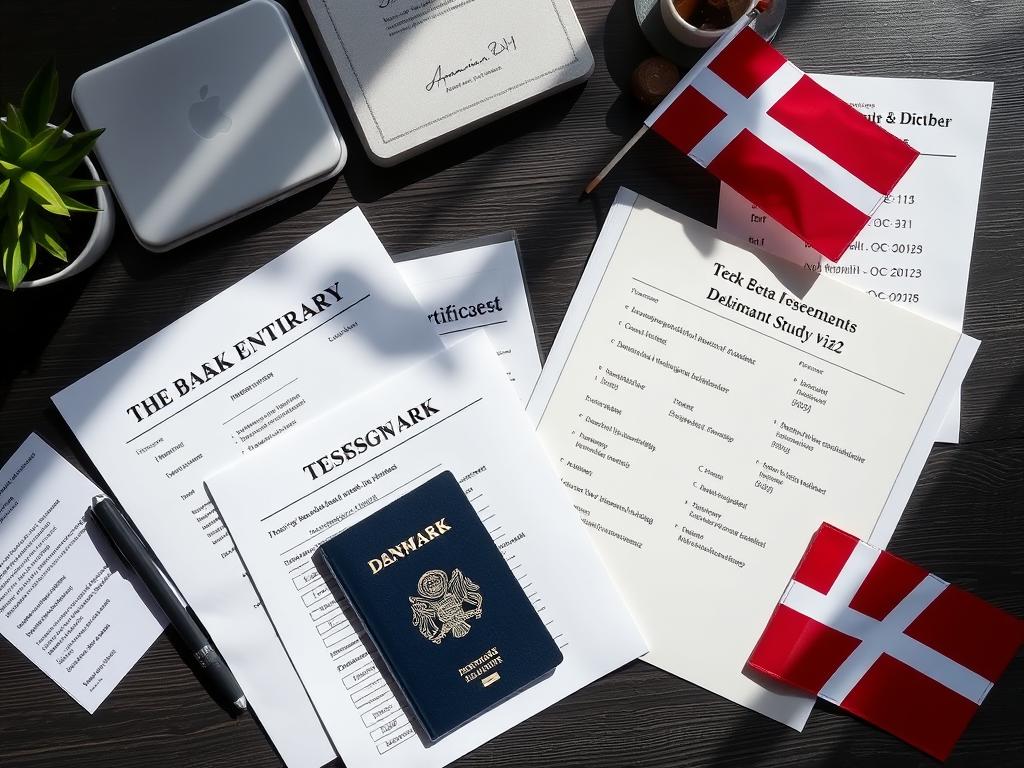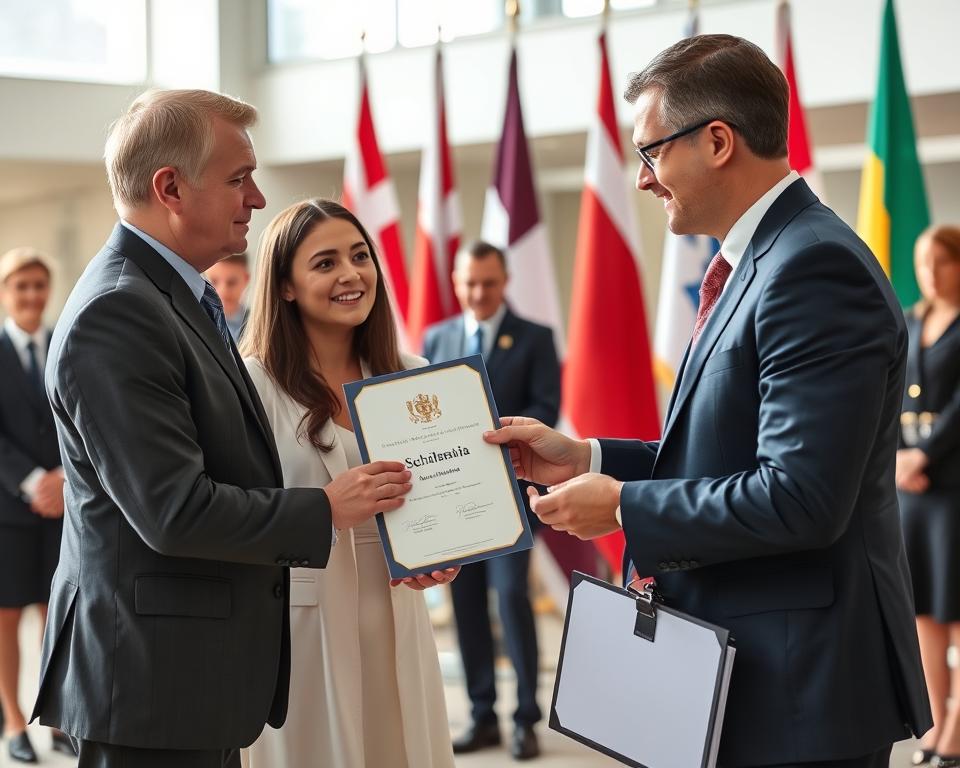Admission Process for Danish Universities
Securing admission to a Danish university is the first crucial step toward obtaining your Denmark student visa. The process requires careful planning and attention to detail, but with the right approach, it can be navigated successfully.
Step-by-Step Application Timeline
The Danish academic year typically begins in September, with some programs offering February intake. For September admission, applications usually open in November and close by March for non-EU students. For February intake, applications open in May and close by October. It’s essential to start your application process at least 8-10 months before your intended start date.
Most Danish universities use a centralized application system called Optagelse.dk for bachelor’s programs, while master’s applications are typically handled through individual university portals.
Key Application Deadlines
- November-January: Application period opens
- 15 March: Deadline for most non-EU applicants (September intake)
- 1 October: Deadline for most non-EU applicants (February intake)
- April-June: Admission decisions for September intake
- November-December: Admission decisions for February intake
Entry Requirements for Pakistani Students
Danish universities evaluate applications based on academic qualifications, language proficiency, and program-specific requirements. For Pakistani students, the following qualifications are typically required:
| Degree Level | Academic Requirements | Language Requirements | Additional Documents |
| Bachelor’s | Higher Secondary Certificate (HSC) or equivalent with good grades in relevant subjects | IELTS: 6.5+ or TOEFL iBT: 90+ | Statement of purpose, recommendation letters |
| Master’s | 4-year bachelor’s degree in a relevant field with minimum 60% marks | IELTS: 6.5-7.0 or TOEFL iBT: 90-100 | CV, research proposal (if applicable), portfolio (for creative programs) |
| PhD | Master’s degree with research component | IELTS: 7.0+ or TOEFL iBT: 100+ | Research proposal, publications, recommendation letters |
Essential Document Checklist

- Completed application form
- Attested copies of academic transcripts and certificates
- English or Danish language proficiency certificate
- Copy of passport (valid for at least 6 months beyond your intended stay)
- Passport-sized photographs (with white background)
- Statement of purpose/motivation letter
- Letters of recommendation (typically 2-3)
- Curriculum Vitae/Resume
- Proof of application fee payment
- Portfolio (for art, design, or architecture programs)
- Research proposal (for research-based programs)
- Proof of work experience (if applicable)
Ready to Start Your Application?
Get personalized guidance on choosing the right program and preparing a strong application for Danish universities.
Scholarships and Funding Options for Denmark Study Visa
Financing your education in Denmark is a crucial consideration. While tuition fees can be substantial for non-EU students, numerous scholarship opportunities can significantly reduce your financial burden.

Government-Funded Scholarships
Danish Government Scholarships
The Danish government offers scholarships specifically for talented non-EU/EEA students. These competitive scholarships typically cover full or partial tuition fees and sometimes include a contribution toward living expenses.
- Danish Government Scholarships for Non-EU/EEA Students: Administered by Danish higher education institutions to attract highly qualified full-degree students.
- Cultural Agreements Program: Scholarships based on bilateral agreements between Denmark and several countries, including Pakistan.
- Erasmus+ Program: Although primarily for EU students, some opportunities exist for Pakistani students through partner institutions.
University-Specific Scholarships
University of Copenhagen
Offers merit-based scholarships covering full tuition and sometimes including a grant for living expenses for exceptionally talented non-EU/EEA students.
Technical University of Denmark (DTU)
Provides DTU Scholarship Programme for outstanding MSc applicants, covering full tuition fees and potentially including a monthly stipend.
Aarhus University
Awards scholarships that cover partial to full tuition fees for talented international students based on academic achievement.
External Funding Resources
Beyond university and government scholarships, Pakistani students can explore several external funding options:
- Higher Education Commission (HEC) Pakistan: Offers various scholarship programs for Pakistani nationals to study abroad.
- Fulbright Scholarships: While primarily for US education, some Fulbright programs support study in Denmark.
- Danish Innovation Fund: Provides funding for PhD and industrial PhD projects.
- Private Foundations: Organizations like the Novo Nordisk Foundation and Carlsberg Foundation offer research grants and scholarships.
Pro Tip: Apply for multiple scholarships simultaneously to increase your chances. Most scholarship applications require strong academic records, compelling motivation letters, and sometimes research proposals or portfolios.
Tuition Fees and Living Costs in Denmark
Understanding the financial aspects of studying in Denmark is essential for proper planning. While Denmark offers high-quality education, it comes with corresponding costs that vary based on your program and lifestyle choices.
Tuition Fee Structure

Tuition fees in Denmark vary significantly depending on your citizenship status and chosen program:
| Student Category | Bachelor’s Programs (per year) | Master’s Programs (per year) | PhD Programs |
| EU/EEA/Swiss Citizens | Free | Free | Fully funded (salary-based) |
| Non-EU/EEA Citizens (including Pakistani students) | €8,000 – €15,000 | €10,000 – €18,000 | Typically funded through scholarships |
Business, engineering, and medical programs typically fall at the higher end of the tuition range, while humanities and social sciences programs may be more affordable.
Monthly Living Expenses Breakdown
To obtain a Denmark student visa, you must prove you have sufficient funds to cover your living expenses. The Danish Immigration Service requires approximately DKK 6,397 (€860) per month or DKK 76,764 (€10,320) per year.
Here’s a breakdown of typical monthly expenses in Danish cities:
Average Monthly Budget
- Accommodation: DKK 3,000-5,000 (€400-670)
- Food: DKK 1,500-2,000 (€200-270)
- Transportation: DKK 300-500 (€40-67)
- Books and supplies: DKK 300-500 (€40-67)
- Internet and phone: DKK 200-300 (€27-40)
- Leisure activities: DKK 500-1,000 (€67-135)
- Health insurance: Covered with CPR number
Money-Saving Tips for Students

- Student Housing: Apply early for kollegium (student dormitories) which are significantly cheaper than private rentals.
- Student Card: Get an International Student Identity Card (ISIC) for discounts on transportation, museums, and restaurants.
- Bicycle: Invest in a bicycle—the most economical and popular transportation method in Denmark.
- Grocery Shopping: Shop at budget supermarkets like Netto, Fakta, and Rema 1000 instead of premium stores.
- Part-time Work: Utilize your right to work part-time (see section below) to supplement your income.
- Free Activities: Take advantage of Denmark’s numerous free museums, parks, and cultural events.
Part-Time Work Rules for International Students
Working while studying can help offset your living expenses in Denmark and provide valuable professional experience. However, there are specific regulations you must follow to maintain your legal status.

Work Hour Limitations
As a non-EU/EEA student (including Pakistani students) with a Denmark student visa, you are permitted to work part-time while studying. However, there are strict limitations on working hours:
- During semester: Maximum 20 hours per week (September to May)
- During holidays: Full-time (up to 37 hours per week) during June, July, and August
Exceeding these hour limitations is considered illegal work and can result in serious consequences, including fines, warnings, or even revocation of your residence permit.
Important: You must have a CPR number (Danish personal identification number) and a tax card before starting any work in Denmark. Your employer will require these documents for legal employment.
Unlike some countries, you don’t need a separate work permit if you have a valid Denmark student residence permit. The work authorization is already included in your student visa.
Popular Student Job Sectors
International students in Denmark commonly find employment in these sectors:
Hospitality & Service
- Cafés and restaurants
- Hotels
- Retail shops
- Delivery services
University Positions
- Teaching assistants
- Research assistants
- Library assistants
- Administrative support
Tech & Startups
- Software development
- Digital marketing
- Content creation
- Customer support
Finding Student Jobs
Here are some effective ways to find part-time work in Denmark:
- University job boards: Most Danish universities have dedicated job portals for student positions.
- Online platforms: Websites like Jobindex, Jobbank, and Studenterjob list student-friendly positions.
- Networking: Many jobs in Denmark are filled through personal connections and recommendations.
- Social media: Facebook groups for international students often share job opportunities.
- Direct approach: Submitting unsolicited applications to companies of interest can be effective in Denmark.
“Working part-time during my studies at Aarhus University not only helped me financially but also improved my Danish language skills and expanded my professional network significantly.”
Post-Study Settlement Options in Denmark
Denmark offers attractive pathways for international graduates to remain in the country after completing their studies. Understanding these options can help you plan your long-term career and immigration strategy.

Job-Seeking Visa After Graduation
After completing your degree in Denmark, you can apply for a job-seeking residence permit that allows you to stay in the country while looking for employment:
- Duration: 6 months from the date of program completion
- Eligibility: Must have completed a higher education program in Denmark
- Application: Must be submitted before your student residence permit expires
- Work rights: Full-time work is permitted during this period
This extended stay gives you valuable time to find relevant employment in Denmark without the pressure of immediately leaving the country after graduation.
Permanent Residency Pathways
While you cannot obtain permanent residency immediately after graduating, Denmark offers clear pathways toward permanent settlement. To qualify for permanent residency, you typically need to:
- Have legally resided in Denmark for at least 8 years
- Have been employed for at least 3.5 years within the last 4 years
- Pass the Danish language test at level A2
- Have no criminal record or outstanding public debt
- Be financially self-sufficient
- Sign a declaration of integration and active citizenship
Fast-Track Options
You may qualify for permanent residency in as little as 4 years if you meet additional requirements:
- Active employment with higher income threshold
- Danish language proficiency at level B1 or higher
- Active participation in Danish society (volunteering, associations)
- Stable, full-time employment for at least 4 years
Key Industries Hiring International Graduates

Denmark has several thriving sectors that actively recruit international talent, particularly in fields experiencing skills shortages:
Technology & IT
- Software development
- Data science and analytics
- Cybersecurity
- UX/UI design
Engineering & Green Tech
- Renewable energy
- Sustainable construction
- Biotech and pharmaceuticals
- Manufacturing
Business & Finance
- International marketing
- Supply chain management
- Financial analysis
- Business development
Ready to Plan Your Future in Denmark?
Get expert guidance on post-study work opportunities and immigration pathways in Denmark.
Conclusion: Your Denmark Study Journey Begins Here
Embarking on your educational journey to Denmark opens doors to world-class education, vibrant cultural experiences, and promising career opportunities. From navigating the admission process and securing a Denmark study visa to exploring scholarship options and understanding post-graduation pathways, this guide has covered the essential aspects of studying in Denmark as an international student.
Remember that careful planning, timely applications, and thorough research are key to a successful study abroad experience. Denmark’s combination of high-quality education, work-life balance, and post-study opportunities makes it an excellent choice for ambitious international students looking to build global careers.
Take the first step toward your Danish education adventure today by exploring programs, preparing your application documents, and reaching out to universities for specific guidance tailored to your academic goals.
Start Your Denmark Study Journey Today
Find programs, check requirements, and get personalized guidance for studying in Denmark.


